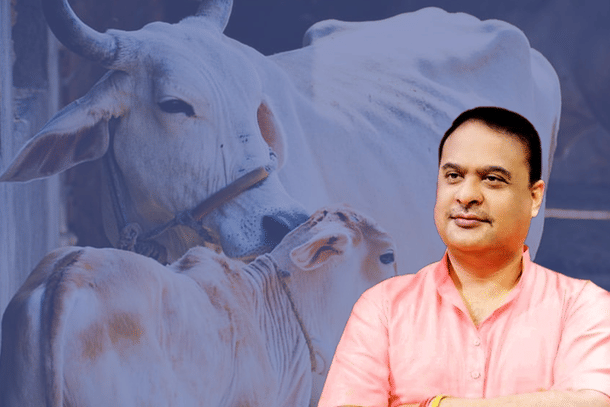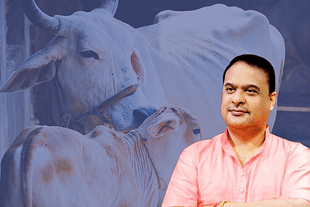Politics
Assam Chief Minister Himanta Biswa Sarma Needs To Be Thanked For Jamiat Leader’s Appeal To Muslims To Shun Cow Slaughter On ‘Bakri Eid’
Jaideep Mazumdar
Jul 05, 2022, 12:29 PM | Updated 12:29 PM IST
Save & read from anywhere!
Bookmark stories for easy access on any device or the Swarajya app.


A lot is being made out in the media about an appeal by the Assam unit chief of Jamiat Ulema-e-Hind, Maulana Badruddin Ajmal, to Muslims of the state not to slaughter cows during Eid Al Adha, popularly known as ‘Bakri Eid’.
Ajmal, who is also the founder of Islamist political party All India United Democratic Front (AIUDF), issued the appeal on the grounds that cow slaughter hurts the sentiments of followers of Sanatan Dharma. He said that Islam does not mandate slaughter of cows and that other animals can be offered for qurbani during Eid Al Adha.
Ajmal said that since Hindus revere the cow, there is no need for Muslims to offer the animal for sacrifice during ‘Bakri Eid’ (watch this video). He said he was making this “strong appeal” to Muslims to promote communal harmony.
Ajmal added that the Darul Uloom Deoband, the prime Sunni Islamic seminary in the world, had issued a similar appeal a couple of years ago.
Many were quick to congratulate Ajmal and laud his gesture. The mainstream media acclaimed Ajmal and praised his appeal, holding him up as a shining example of secularism.
But Ajmal has actually made a virtue out of a necessity. And the credit for the ‘necessity’ rightfully goes to Assam Chief Minister Himanta Biswa Sarma.
Sarma introduced and successfully piloted the Assam Cattle Preservation Act in the state assembly last year. The bill, which has become an act, prohibits the slaughter of cows, heifers and calves in the state.
The act bans sale or offer of beef or beef products in any area “predominantly inhabited’ by Hindus, Buddhists, Sikhs, Jains and other ‘non-beef-eating communities’ and also within a five kilometre radius of a mandir, satra (Vaishnavite religious institution), gurudwara and place of worship or religious institution belonging to non-beef eating communities.
Thus, in effect, cow slaughter is illegal in Assam. The anti-cow slaughter legislation lays down stiff penalties for violations: jail terms ranging from three to eight years and fines ranging from Rs 3 lakh to Rs 5 lakh. All offences under the act are cognizable and non-bailable. The act prescribes double the penalty — jail terms and fines — for repeat offenders.
There is, thus, no way that Muslims can sacrifice and slaughter cows (including heifers and calves) on Eid Al Adha in Assam without running foul of the law. The Assam government has been very strict about detecting and punishing those who violate the law.
The act was passed by the Assam Assembly on 13 August 2021 and came into force immediately. Since Eid Al Adha fell on 20 July last year, Muslims in Assam could sacrifice cows. But they will not be able to do so this year.
Given this, Ajmal’s appeal is completely redundant since the law prohibits cow slaughter in any part of Assam. Even without his appeal, Muslims would not have been able to sacrifice cows, or distribute the beef to friends, relatives and the poor as is the practice (to distribute the meat of the sacrificed animal amongst others).
Badruddin Ajmal’s appeal was also not aimed at promoting religious harmony as is being made out, and neither did it have any undertones of secularism and goodwill towards non beef-eating communities. In fact, the appeal was issued solely to prevent Muslims from being prosecuted under the act.
The Assam government, it is learnt, was gearing up to apprehend and prosecute violators of the Assam Cattle Preservation Act, 2021. Had cows being sacrificed on Eid this year, as had happened with gay abandon till last year, a number of Muslims would have found themselves behind bars.
It is to pre-empt this that Ajmal, who has courted controversies in the past with Islamist statements, issued the appeal against cow qurbani (sacrifice) this year. The appeal was not prompted by any desire to promote communal harmony and generate goodwill between Hindus and Muslims as he, and many in the media, are claiming.
A Bharatiya Janata Party (BJP) spokesperson pointed out that Ajmal had distributed cows for qurbani to Muslims till last year. “If he is so aware and conscious of the reverence for cows among Hindus, and of the need to respect sentiments of Hindus, why did he not issue the appeal earlier? He had distributed cows for slaughter during Eid till last year,” said Assam BJP leader Ratna Singh.
The Congress in Assam was also dismissive of Ajmal’s appeal. State Congress president Bhupen Borah said that Ajmal issued the appeal to get into the good books of the BJP. “He did it primarily to curry favour with the BJP to protect his business interests,” said Bora.
Ajmal has been in the news in the past for making Islamist remarks — he demanded a ban on Kashmir Files on the grounds it showed Muslims in a poor light. His party had opposed the Cattle Preservation Act when it was being debated in the assembly last year. Ajmal had founded the AIUDF to protect the rights of Bangladesh-origin Muslim migrants in Assam.
At the time of passing the bill, Chief Minister Sarma asserted that the bill would promote communal harmony. “According to crime statistics, a number of communal clashes, especially in lower Assam, have occurred due to cow slaughter. The ban on cow slaughter will preclude such clashes and disturbances, and will promote goodwill between the two communities,” Sarma had said.
It is, thus, Chief Minister Himanta Biswa Sarma who needs to be credited for the prevention of cow ‘sacrifice’ during Eid Al Adha this year. Ajmal’s appeal is redundant and irrelevant.
Jaideep Mazumdar is an associate editor at Swarajya.




